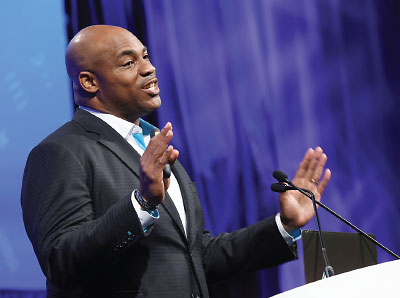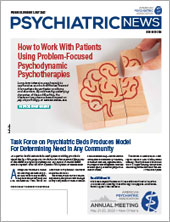“Stop living in oblivion” about the vast injustice of health care disparities in America, said Anton Gunn, former senior advisor to President Barack Obama, in an urgent keynote address at the Opening Session of APA’s Annual Meeting in New Orleans.
“This is the most important time in the history of your association,” said Gunn. “I have learned a lot about you, and I am so inspired and impressed by your attention to the social determinants of health.”
Gunn said the existence of separate systems of health care for the haves and the have nots in America is overwhelming. And people and institutions are resistant to making the changes that might make a difference.
“The biggest challenge is that most organizations and their leaders are stuck” in what he called the social conscious construct in which only a tiny percentage of people are both aware of injustice and willing to make changes to remedy it. “The more you are around a system, the more you are aware of injustices,” he said. “All of you who have been in practice for years know every crevice and every problem in [our health care system]. And the more you are around, the more you have an opportunity to do something about it.
“But 50% of people are living in oblivion,” blind to the problems around them. “Another 35% sit in the intersection of injustice; they know something is messed up, but they don’t do better because they make excuses—‘It’s someone else’s problem,’ ‘I don’t have the time,’ ‘I don’t have the credentials,’ ‘I am not in charge.’ ” Another 10% “at the top of the food chain actually reinforce the system because they are comfortable with the status quo. So 95% of the people in a system, for one reason or another, perpetuate the system. That leaves 5% who are aware of the challenges and use their power and talents to make things right.”
Gunn leveraged his early experience as a community organizer to spearhead Obama’s first presidential election campaign in South Carolina as his political director. Gunn is credited with galvanizing support, especially among Black voters, for the then-Illinois senator and helping to launch his successful candidacy. Gunn went on to become the first Black man elected from District 79 to the South Carolina House of Representatives.
After being tapped for a leadership role by Obama two years later, Gunn served as the director of external affairs at the Department of Health and Human Services (HHS). He advised both Obama and then HHS Secretary Kathleen Sebelius on how to overcome opposition to make the Affordable Care Act (ACA) a success. As part of that role, he helped design the outreach strategy that secured the critical enrollment of 7 million Americans during the program’s first few months.
Gunn recounted for the audience his history of growing up in a military family. “I always assumed health care was a right because for me and my family in the military system, it was.”
However, while still in college he was hired as a health care reform coordinator for South Carolina Fair Share and assigned to go door to door inquiring whether people had health insurance. “In the summer of 1996, I went door to door in a public housing project. My first question was ‘Do you have health insurance?’ One hundred percent of the time the answer was no. Second question—’Do you have children in the home?’ About 80% of the time the answer was yes. ‘Do your kids have health insurance?’ The answer was always no.
“The answers to my fourth question transformed my life: ‘What do you do when you get sick?’ I heard some of the most horrific things I have ever heard in my life.”
Gunn said that’s when he learned that there are systems of care for the haves and the have nots. “In every city there are two kinds of hospitals—the one you and your loved one would always want to go to, and another one you would never want to go to. That’s when I learned that your health status can be determined by your race, your nationality, your ZIP code.
“We don’t have one health care system,” Gunn continued. “We have six—private insurance, Medicare, Medicaid, veterans, active-duty military, and another system for everyone else that is the most fractured and broken.”
Gunn ended his remarks with a challenge to his audience: “When you leave New Orleans, there is no excuse for you to be in the 50% that is living in oblivion. Start talking about health disparities. Take responsibility for the problem and the solution, and remember that diversity is an asset, not a liability. Invest in addressing social determinants of health, connect with your local community, and remember that cultural competency is key. Invest in your own professional development, and take care of yourself before you take care of others. Mentor the next generation.
“You can be part of a team to make the impossible possible.” ■

